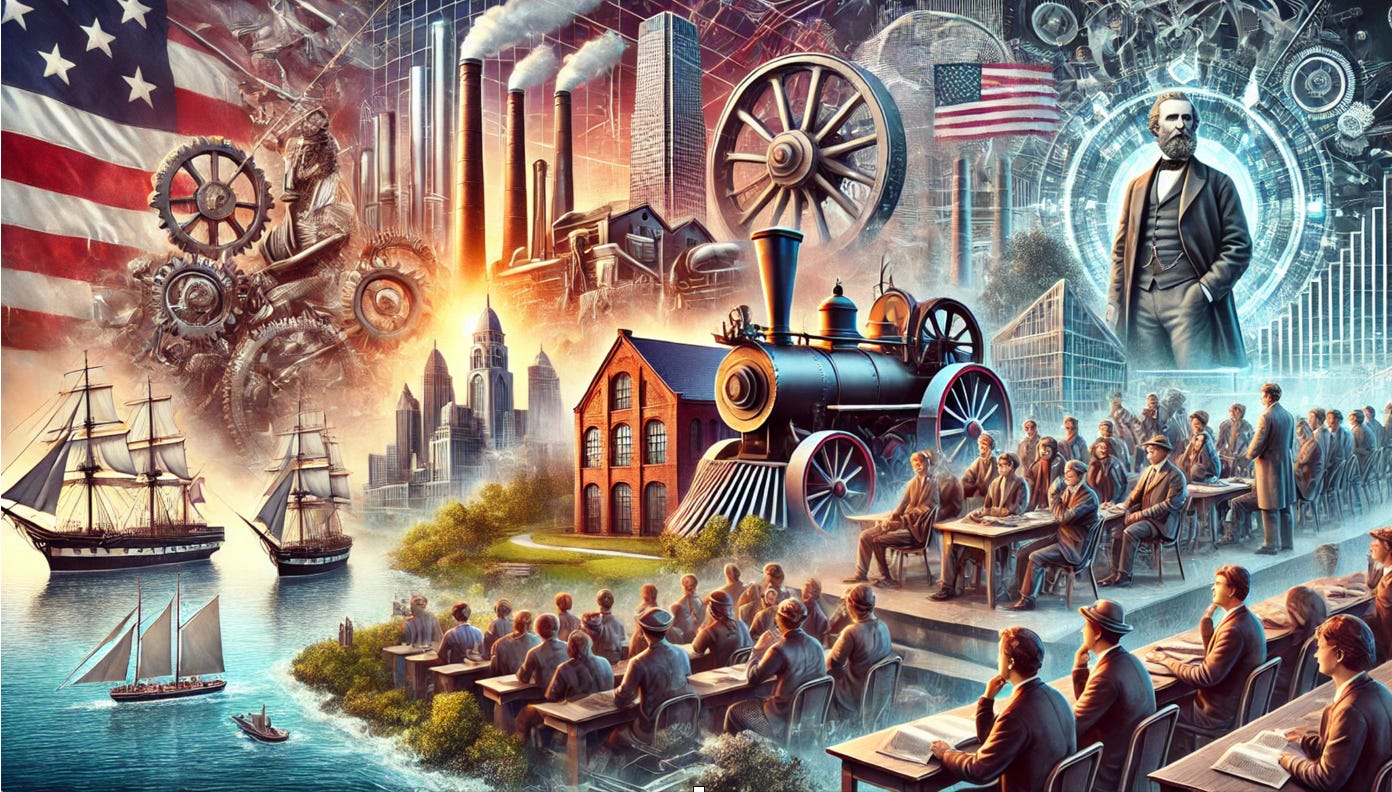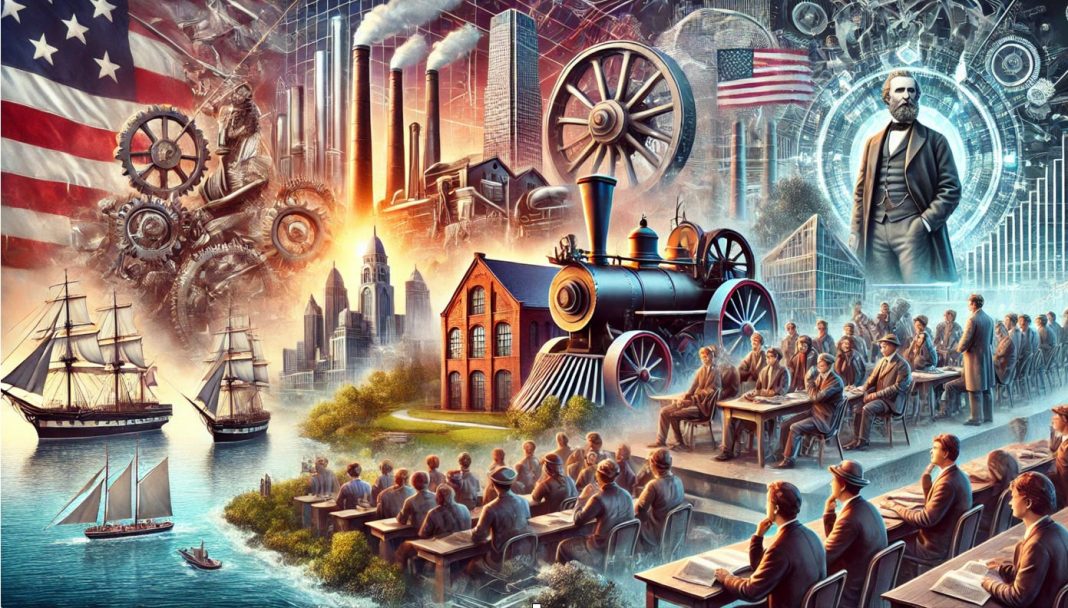Late to the party am I, but at least I think I have brought plenty of refreshments…
What I see as the big questions of American economic history: How is America “exceptional”? What about its comparative & historical situation primed it to become “exceptional”? How did the conquest-expansion economy of the 1700s & 1800s work? How did a country that ought to have been a gigantic resource-exporting Australia become a manufacturing powerhouse instead, or as well? & how did it become THE technological leader & the pioneer of the mass-production mode too? & how did it become the most effective civilization at expanding its citizen base since the Romans? & how did it become a feminist-friendly economy—or did it? Was the New Deal Order a design or an accident, & was it a success or a failure, & was its 1970s end a mercy or a mistake? Where and how and what Silicon Valley? What happened to equality of opportunity as an ideal? & why could the Neoliberal Order not apply the standard Bagehot-Minsky-Kindleberger playbook to deal with the 2007-2009 Global Financial Crisis? And Attention Info-Bio Tech economy what?

[NO SECTIONS WEEK 1]
2025-01-22 We
2025-01-24 Fr
[SECTION WEEK 2]
2025-01-27 Mo
2025-01-29 We
[2025-01-31 Fr]
-
Allen, Robert C. 2011. Global Economic History: A Very Short Introduction. Oxford: Oxford University Press. <https://archive.org/details/globaleconomichi0000alle>. Chs. 1-4, 6, & Epilogue (“The Great Divergence”, “The Rise of the West”, “The Industrial Revolution”, “The Ascent of the Rich”, & “The Americas”)
-
Boyer, Paul S. 2012. American History: A Very Short Introduction. New York: Oxford University Press. <https://books.google.com/books/about/American_History.html?id=C6B13ky6vkQC>. Entire.
-
Friedman, Walter A. 2020. American Business History: A Very Short Introduction. New York: Oxford University Press. <https://academic.oup.com/book/28380>, Introduction & Conclusion (“A Business Civilization” & “Sustainability”)
[SECTION WEEK 3]
2025-02-03 Mo
2025-02-05 We
[2025-02-07 Fr]
-
Nunn, Nathan, & Nancy Qian. 2010. “The Columbian Exchange: A History of Disease, Food, and Ideas.” Journal of Economic Perspectives. 24 (2): 163–88. <https://www.aeaweb.org/articles?id=10.1257/jep.24.2.163>.
-
Allen, Robert C. 2011. Global Economic History: A Very Short Introduction. Oxford: Oxford University Press. <https://archive.org/details/globaleconomichi0000alle>. Chs. 1 & 2 (“The Great Divergence” & “The Rise of the West”).
-
Boyer, Paul S. 2012. American History: A Very Short Introduction. New York: Oxford University Press. <https://books.google.com/books/about/American_History.html?id=C6B13ky6vkQC>. Chs. 1-3 (“Beginnings”, “Revolution, Constitution, a New Nation”, & “The Promise & Perils of Nationhood”).
-
Friedman, Walter A. 2020. American Business History: A Very Short Introduction. New York: Oxford University Press. <https://academic.oup.com/book/28380>. Ch. 2 (“Commerce in the New Nation”).
[SECTION WEEK 4]
2025-02-10 Mo
2025-02-12 We
[2025-02-14 Fr]
-
Boyer, Paul S. 2012. American History: A Very Short Introduction. New York: Oxford University Press. <https://books.google.com/books/about/American_History.html?id=C6B13ky6vkQC>. Ch. 4 (“Slavery & Civil War”)
-
Halliday, E. H. 2001. Understanding Thomas Jefferson. New York: Harper-Collins. <https://archive.org/details/understandingtho00hall>. Chs. 0, 7, 8, 9, & 11 (“Introduction”, “A Big Surprise: Sally Hemings”, “Eros on the Champs-Élyseés”, “Return of the Natives”, & “Slave Master—& Racist”)
[SECTION WEEK 5]
2025-02-19 We
2025-02-21 Fr
[SECTIONS: EXAM REVIEW]
2025-02-24 Mo
2025-02-26 We
2025-02-28 Fr: MIDTERM 1
-
Friedman, Walter A. 2020. American Business History: A Very Short Introduction. New York: Oxford University Press. <https://academic.oup.com/book/28380>. Chs. 4, 5, & 6 (“Railroads & mass distribution, 1850–1880”, “An industrial country, 1880–1910”, & “Modern companies, 1910–1930”).
-
Chandler, Alfred D. 1992. “Organizational Capabilities and the Economic History of the Industrial Enterprise.” Journal of Economic Perspectives. 6 (3): 79–100. <https://www.aeaweb.org/articles?id=10.1257/jep.6.3.79>.
-
Boyer, Paul S. 2012. American History: A Very Short Introduction. New York: Oxford University Press. <https://books.google.com/books/about/American_History.html?id=C6B13ky6vkQC>. Chs. 5 & 6 (“Industrialization & its consequences” & “Reform & War”)
-
Allen, Robert C. 2011. Global Economic History: A Very Short Introduction. Oxford: Oxford University Press. <https://archive.org/details/globaleconomichi0000alle>. Ch. 4 (“The Ascent of the Rich”)
[SECTION WEEK 7]
2025-03-03 Mo
2025-03-05 We
[2025-03-07 Fr]
[SECTION WEEK 8]
2025-03-10 Mo
2025-03-12 We
[2025-03-14 Fr]
[SECTION WEEK 9]
2025-03-17 Mo
2025-03-19 We
[SECTIONS: EXAM REVIEW]
2025-03-31 Mo
2025-04-02 We
2025-04-04 Fr: MIDTERM 2
[SECTION WEEK 11]
2025-04-07 Mo
2025-04-09 We
[2025-04-11 Fr]
-
Brand, Stewart. 1968. Whole Earth Catalog. Fall 1968. Menlo Park, CA: Portola Institute. <https://archive.org/details/1stWEC-complete>.
-
Moore, Gordon E. 1965. “Cramming More Components onto Integrated Circuits.” Electronics. 38 (8): 114–117. <https://www.cs.utexas.edu/~fussell/courses/cs352h/papers/moore.pdf>.
-
Friedman, Walter A. 2020. American Business History: A Very Short Introduction. New York: Oxford University Press. <https://academic.oup.com/book/28380>. Ch 9. (“Entrepreneurs & the global economy, 1980-2020”).
-
Katz, Michael L., & Carl Shapiro. 1994. “Systems Competition and Network Effects.” Journal of Economic Perspectives. 8 (2): 93–115. <https://www.aeaweb.org/articles?id=10.1257/jep.8.2.93>.
-
Jobs, Steve. 2005. “You’ve Got to Find What You Love.” Commencement address, Stanford University, June 12. <https://news.stanford.edu/2005/06/14/jobs-061505/>.
[SECTION WEEK 12]
2025-04-14 Mo
2025-04-16 We
[2025-04-18 Fr]
-
Alvaredo, Facundo, Anthony B. Atkinson, Thomas Piketty, & Emmanuel Saez. 2013. “The Top 1 Percent in International and Historical Perspective.” Journal of Economic Perspectives. 27 (3): 3-20. <https://www.aeaweb.org/articles?id=10.1257/jep.27.3.3>.
-
Chetty, Raj, Matthew O. Jackson, Theresa Kuchler, Johannes Stroebel, Nathaniel Hendren, Robert B. Fluegge, Sara Gong, & al. 2022. “Social Capital I: Measurement and Associations with Economic Mobility.” Nature. 608 (7921): 108–121. <https://www.ncbi.nlm.nih.gov/pmc/articles/PMC9352590/>.
[SECTION WEEK 13]
2025-04-21 Mo
2025-04-23 We
[2025-04-25 Fr]
[SECTIONS: PRE-FINAL REVIEW]
2025-04-28 Mo
2025-04-30 We
[2025-05-02 Fr]
-
Wolfram, Stephen. 2023. “What Is ChatGPT Doing … and Why Does It Work?” Stephen Wolfram Writings. February 14. <https://writings.stephenwolfram.com/2023/02/what-is-chatgpt-doing-and-why-does-it-work/>.
-
Lippman, Walter. 1922. Public Opinion. London: George Allen & Unwin. <https://ia801506.us.archive.org/1/items/in.ernet.dli.2015.126489/2015.126489.Public-Opinion.pdf> Chs. 20, 21, 23, & 24 (“The Old Image of Democracy”, “A New Image of Democracy”, “The Appeal to the Public”, & “The Appeal to Reason”).
-
DeLong, J. Bradford, & A. Michael Froomkin. 2000. “Speculative Microeconomics for Tomorrow’s Economy.” In Internet Publishing & Beyond: The Economics of Digital Information & Intellectual Property. Ed. Brian Kahin & Hal R. Varian. Cambridge, MA: MIT Press. <https://repository.law.miami.edu/fac_books/144/>.
-
Sandberg, Anders, Eric Drexler, & Toby Ord. 2018. “Dissolving the Fermi Paradox.” arXiv. <https://arxiv.org/abs/1806.02404>.
2025-05-05 Mo: PULLING THINGS TOGETHER
2025-05-12 Mo 19:00 PDT: FINAL EXAM
If reading this gets you Value Above Replacement, then become a free subscriber to this newsletter. And forward it! And if your VAR from this newsletter is in the three digits or more each year, please become a paid subscriber! I am trying to make you readers—and myself—smarter. Please tell me if I succeed, or how I fail…
